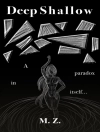‘No one else has ever made avant-garde, experimental poems so attractive to both the general and the special reader.’—Randall Jarrell
The one hundred and fifty-six poems here, arranged in twelve sections and introduced by E. E. Cummings’s biographer, Richard S. Kennedy, include his most popular poems, spanning his earliest creations, his vivacious linguistic acrobatics, up to his last valedictory sonnets. Also featured are thirteen drawings, oils, and watercolors by Cummings, most of them never before published.
Adjusting type size may change line breaks. Landscape mode may help to preserve line breaks.เกี่ยวกับผู้แต่ง
E. E. Cummings (1894–1962) was among the most influential, widely read, and revered modernist poets. He was also a playwright, a painter, and a writer of prose. Born in Cambridge, Massachusetts, he studied at Harvard University and, during World War I, served with an ambulance corps in France. He spent three months in a French detention camp and subsequently wrote The Enormous Room, a highly acclaimed criticism of World War I. After the war, Cummings returned to the States and published his first collection of poetry, Tulips & Chimneys, which was characterized by his innovative style: pushing the boundaries of language and form while discussing love, nature, and war with sensuousness and glee. He spent the rest of his life painting, writing poetry, and enjoying widespread popularity and success.












